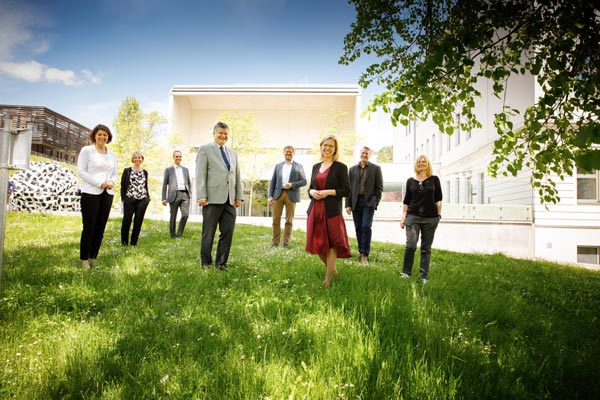June 7, 2021
Cutting-edge research up close – Federal Minister for Climate Action Leonore Gewessler visits IST Austria
Together with researchers, she discussed the development of the Institute and the importance of research for a sustainable future.

Last week Leonore Gewessler, Federal Minister for Climate Action, Environment, Energy, Mobility, Innovation and Technology, visited the Institute of Science and Technology Austria. IST Austria President Thomas Henzinger guided her through the Institute and proudly showed its development: From the initial ten employees in 2009, the Institute has grown to more than 900 employees and 65 professors in the fields of biology, neuroscience, mathematics, computer science, physics, chemistry, and life sciences.
Together with Vice President Michael Sixt and Managing Director Georg Schneider, Thomas Henzinger presented the plans for the Institute’s future: the institute is to grow to 90 research groups by 2026 and 150 groups by 2036.
During her visit, Climate Action Minister Gewessler met four leading researchers: Professor Eva Benková explained how plants react and adapt to environmental influences. Professor Stefan Freunberger and Leonore Gewessler discussed current developments in energy storage, and Professor Maria Ibáñez presented her research on thermoelectric materials, which can convert heat into electricity and vice versa. Another area of research at IST Austria is quantum materials, the building blocks of quantum computers, on which Professor Kimberly Modic is conducting research.
Climate Action Minister Gewessler was impressed by the successes of IST Austria, which has made it to the top of world research in such a short time after its foundation: “The pandemic, in particular, has shown us how important research is for all of us. Also, in the fight against the climate crisis, research is indispensable and an important component that provides us with solutions for the problems of today and tomorrow. To achieve our climate neutrality goals in 2040 and 100 percent electricity from renewable energies in 2030, we need well-trained researchers to develop new solutions and advance existing ones. With IST Austria, we have an internationally renowned research institute that is doing exactly that, conducting world-class basic research and ensuring the next generation of top-trained researchers.”



